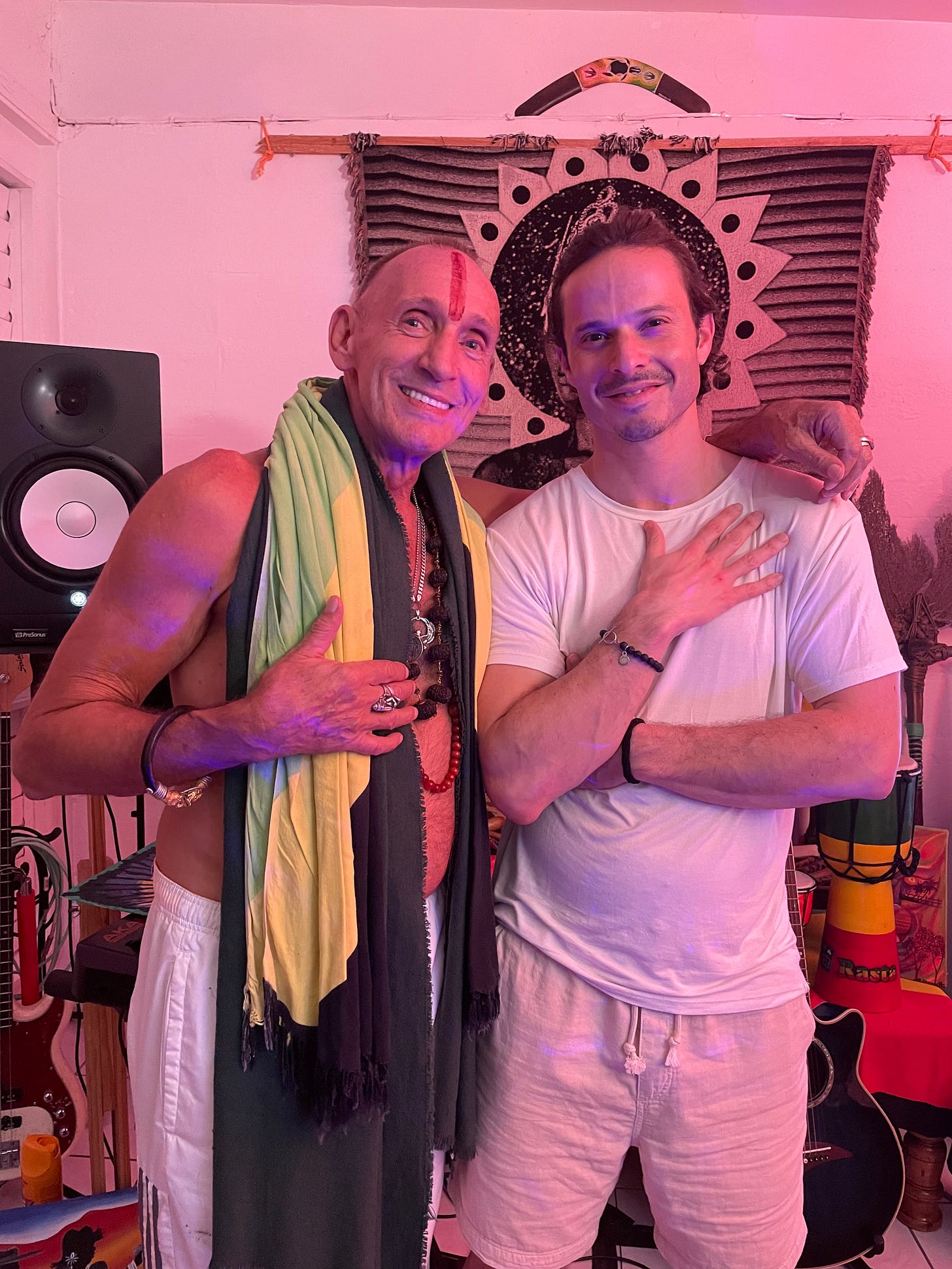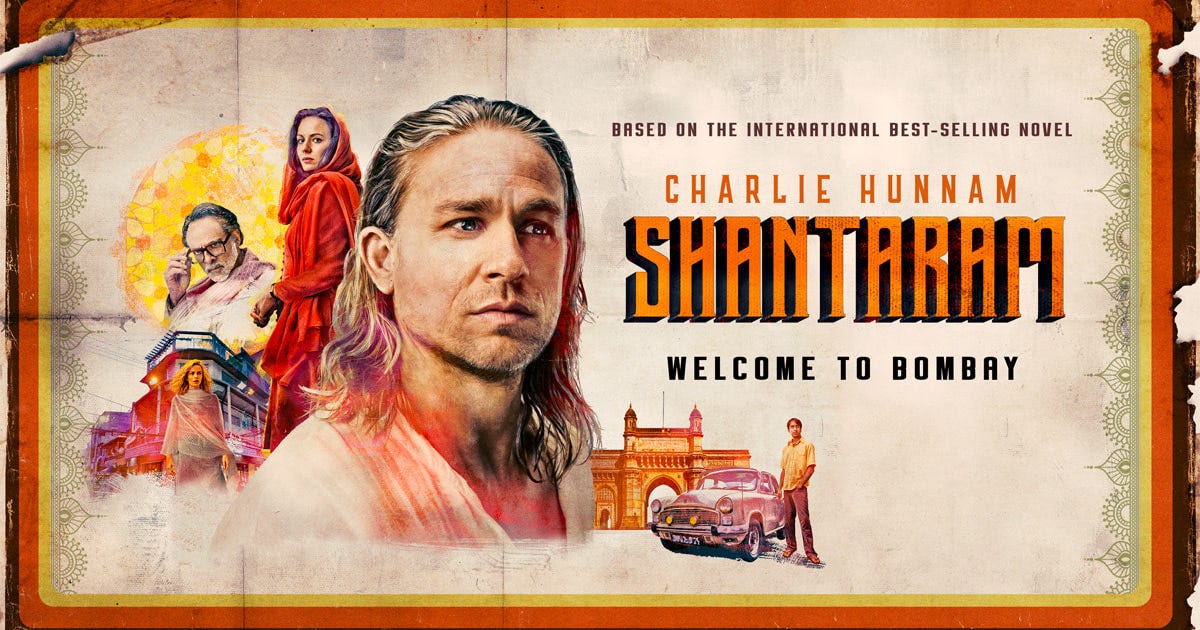In January of 2022, I visited one of my all-time favorite authors in Jamaica, Gregory David Roberts (“GDR”). You can find the audio file of our interview above, which was recorded while we sat outside his rented tropical home, one stone’s throw from the white-sand beach.
GDR is the internationally bestselling author of Shantaram, an epic 993-page novel about a convicted Australian bank robber and heroin addict who escapes from prison and flees to India. Based on the raw elements of GDR’s own remarkable life, the novel is cherished by many readers worldwide. Under the Apple TV+ banner, Shantaram has been adapted into a major TV series that debuted on October 14th, 2023.
Our conversation includes:
Reaching a “Turning Point”
Writing in prison and beyond
Overcoming addiction
Meeting a spiritual teacher
A debate on free will
How the longing for drugs is spiritual
Gangster Tantra
Ethical business practices
You can learn more about GDR on his website, Instagram, Spotify, and YouTube.
Hosted by Alex Olshonsky.
*But*—before you listen to my conversation with GDR or watch the series, you might still be wondering: how the hell did I end up in Jamaica, spending a week with this legendary figure?
When I was twenty-seven and working at Twitter—back when we still believed social media was a force for good in the world—one of my teammates, Rick, told me: “I just finished a book I think you’ll love. It’s a wild tale of crime, drugs, love, and redemption.”
The truth was, at this time, I was only half-heartedly attending therapy, enough to scribble vaguely self-effacing notes in the workbooks my addiction counselors gave me, alongside paging through a non-fiction reading list of neuroscience and spirituality titles. My addicted brain didn’t seem to care that I was going through the motions. Rick knew me well enough to know such a book was right up my alley; what he didn’t know was, by that point, I’d already failed two quiet attempts at outpatient treatment. If I didn’t maintain a harrowing regimen of opiates, benzos, and amphetamines, the down tremors coursing through my legs turned so severe, the withdrawal so encompassing, that I wasn’t able to leave my bed.
Rick was one of the sharpest fellas I knew, the type to rarely recommend fiction over heady non-fiction—and I loved fiction. So, I took his encouragement seriously by downloading Shantaram as an audiobook. Instantly, I was lost in GDR’s magical storytelling. I allowed the reader’s beguiling Australian accent to soothe my nerves, soaking up the narration non-stop between my commutes into Twitter’s headquarters from Oakland and in the late hours before bedtime. While I was usually so high that I could barely observe my body in space, listening to this book made me feel alive and understood somehow. Up until then, so many books I’d read about recovery made the process feel prescriptive, like getting better was another pill I could buy rather than enduring the inexplicable pain of withdrawal. As I listened to Shantaram, I knew GDR was the real deal, and I was determined to know exactly how he’d gone from a wanted felon and heroin addict to a sober, internationally-acclaimed author of heart-wrangling prose?
I began to scour the internet for whatever I could find about this wizardly man. Turns out, after Shantaram’s extraordinary success worldwide, GDR had “retired from public life.” There were surprisingly few interviews or details about the writer online. I couldn’t blame him; hell, I longed to be as anonymous as he was, my past as distant of a memory.
Yet, just as I thought I’d never gain insight into his process, deep in the blogosphere I somehow stumbled across one of GDR’s responses to his readers. I’ll never forget what he wrote:
“As for me, I hit the Turning Point 20 years ago, and I gave up everything on the same day. I haven’t had a drink of alcohol, or a cigarette, or any kind of drug, for the last 20 years. I never think about drugs, and I don’t miss them. I’m not a junkie. I know that a lot of people have been helped by Alcoholics Anonymous and Narcotics Anonymous, and I think that’s a good thing, for the people who are being helped. But I don’t agree with the AA and NA philosophy that ‘once a junkie, always a junkie’ or ‘once an alcoholic, always an alcoholic’. In my experience, that simply isn’t true.”
The notion of reaching a Turning Point equally captivated and haunted me. I knew there must be more to his story. Though I found no new answers online, a seed of possibility had already sprouted somewhere deep within my psyche.
Once in recovery, after tasting my own Shantaram-esque redemption, I felt I had something to share. Everything I’d been through, all that I’d learned, the fire in my chest needed somewhere to flow and be kindled. I’d always considered myself a writer, even though at that time I was scared of sharing my words openly on the page.
But after I read and re-read Shantaram (dead sober this time), I developed an even deeper appreciation for GDR’s gift for developing complex characters and overall storytelling. It inspired me to begin my own daily writing practice each morning. Upon waking, I made a point re-read a page of Shantaram and then write down my own autobiographical fiction for the next twenty minutes. We are what we eat: a writer is what he reads. That was the theory that kept me going, at least.
Fast forward a few years and I had amassed a humble but loyal following of readers. In June of 2021, I wrote an essay titled “Drug-fueled authors, Burnout, and the Turning Point.” It details my early obsession with narcotic-friendly authors like Aldous Huxley, Hunter S. Thompson, and Anthony Kiedis—men whose words enabled my gonzo-delirious worldview. This idea that all geniuses, especially suffering artists, had survived opiates long enough to write about it.
In the process of researching this 2021 essay, I discovered that GDR had reemerged from his sabbatical and was writing about spirituality and making music in Jamaica. There was a contact section on the website, so I submitted it with a note thanking him for his profound impact on my life. I hardly expected an answer to emerge from the void of the interwebs, and so a few weeks later when I heard back from someone on GDR’s team, it was a super dope surprise. They told me that they’d share my essay with GDR, which they did, and he was touched that I reached out.
In return, they sent me a copy of GDR’s latest book, The Spiritual Path. While at first the title felt a bit jarring, considering the sheer number of spiritual books I’ve attempted to read throughout my recovery process, I told myself to have faith: GDR wouldn’t let me down. And he didn’t. In the first few pages he makes a crucial distinction between religion and spirituality by explaining how while religion is what we believe and accept to be true, spirituality is what we experience as true. I felt at ease through GDR’s openness to questioning the nature of spirituality rather than claiming to have all the answers:
“How can we hope to see or directly experience the Divine source of all the Suns in all the Universes, when we can’t stare at our own Sun for five minutes without destroying our vision?”
I think about this existential metaphor often. How we are made of stardust, literal starlight dressed as matter, animals having a human experience for just a handful of decades. A life force capable of creating suns and galaxies and black holes must be so powerful, so all encompassing, that getting anywhere near this force would be enough to destroy us, evaporating the illusion of our own ego at the center of the universe.
Once I finished the book, I couldn’t wait to share my thoughts with GDR. He not only agreed to meet me on Zoom, but he also granted me an interview at his home in Jamaica.
They say, never meet your heroes. If you’re interested, please open the audio file at the top to learn how possible it is for dreams and reality to coexist in real-time.















